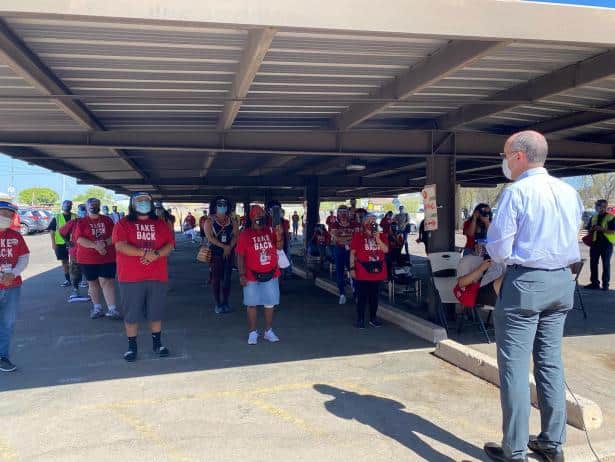Maxwell Ulin is a student at Harvard Law School.
On Wednesday, rideshare drivers lost their case in California state court to restrict Uber from using its app to disseminate political messaging in favor of Proposition 22, a ballot measure bankrolled by several rideshare companies to reverse California’s decision to reclassify drivers as employees. San Francisco Superior Court Judge Richard Ulmer held that drivers failed to prove standing for lack of concrete injury, and that restricting Uber actions would abridge the company’s First Amendment right to speech. Uber is not out of the legal woods yet, though; this past Monday, drivers filed a separate class action lawsuit in federal court complaining that the company stands in violation of the Civil Rights Act for firing drivers based on the app’s passenger ratings system that the company knows is discriminatory. Both lawsuits have taken place before the backdrop of rideshare companies’ statewide initiative, which recent polls show is facing uncertain prospects on Election Day.
California is not the only state with landmark employment laws on the ballot, of course. Voters in Colorado, for example, will vote next month on whether to require businesses of over nine employees to pay into a state-run 12-week paid family and sick leave program for workers. The measure, which would impose a 0.9% payroll tax on employers, would allow employees to receive up to $1,100 per week in benefits within the first year of the program. In Florida, meanwhile, a proposed constitutional amendment would raise the state’s minimum wage to $15 per hour over the next five years and then tying the wage floor to inflation. Academics note that increasing the minimum wage can have a profound effect on reducing the racial wage gap, particularly for Black workers.
As we enter the final days of the U.S. presidential campaign, frontline workers have again entered the spotlight—not as victims of pandemic, but as activists mobilizing Democrats to win. In Nevada, Florida, Pennsylvania, and Arizona, thousands of former hotel and restaurant employees laid off during the pandemic have taken up new work as canvassers and field organizers for UNITE HERE’s nationwide campaign operation. By pioneering a novel, COVID-safe approach to door-knocking, the hospitality workers’ union has come to play an outsized role in field operations this year after national Democrats abandoned in-person canvassing. The attention comes as new polls indicate that Democratic turnout may be lagging in several key states leading up to the final day of voting.






Daily News & Commentary
Start your day with our roundup of the latest labor developments. See all
January 22
Hyundai’s labor union warns against the introduction of humanoid robots; Oregon and California trades unions take different paths to advocate for union jobs.
January 20
In today’s news and commentary, SEIU advocates for a wealth tax, the DOL gets a budget increase, and the NLRB struggles with its workforce. The SEIU United Healthcare Workers West is advancing a California ballot initiative to impose a one-time 5% tax on personal wealth above $1 billion, aiming to raise funds for the state’s […]
January 19
Department of Education pauses wage garnishment; Valero Energy announces layoffs; Labor Department wins back wages for healthcare workers.
January 18
Met Museum workers unionize; a new report reveals a $0.76 average tip for gig workers in NYC; and U.S. workers receive the smallest share of capital since 1947.
January 16
The NLRB publishes its first decision since regaining a quorum; Minneapolis labor unions call for a general strike in response to the ICE killing of Renee Good; federal workers rally in DC to show support for the Protecting America’s Workforce Act.
January 15
New investigation into the Secretary of Labor; New Jersey bill to protect child content creators; NIOSH reinstates hundreds of employees.